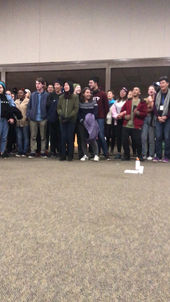
Constructive engagement of conflict (CEC)
The most meaningful leadership experience I have ever had is working with the Constructive Engagement of Conflict (CEC) here in my school. This is an extracurricular activity in which students facilitate restorative justice circles in cases of conflict, community building purposes, participate in student's disciplinary councils as the student's representative in really special cases and organize a retreat every year for incoming students to welcome them and to show them a little bit more about the UWC mission. That means that some students participate twice in the retreat as first years and as second years leaders. I had the opportunity to be a CEC leader during my second year and there were three main lessons that I took from my experience.
The first lesson I took from my experience is to understand that everyone has a story to tell and that these stories make them who they are now. When I participated in the retreat for the second time, I kept asking myself what brought me back to that same event. To be honest, I was quite nervous to be there because we would all be leading groups of students that we barely knew. However, once we started the opening ceremony for the retreat, doing activities that helped us get to know people that we've barely spoken to, I realized that I knew why I was back. I was back because of the feeling of safety, warmth, non-judgemental and supportive environment that the people in my group gave off during story-telling. As people told their story, I realized how hard it could be to not judge someone we do not know, but it is not impossible if everyone is willing to practice active listening and respect towards other people's backgrounds. At the end of the retreat, I could see how students got closer to each other and made new friendships. It also helped me understand why some people have different reactions when a conflict happens, and that at the end of the day we are all humans.
The second lesson I took from my leadership experience in this program is that everyone deserves a chance. Promoting Restorative Justice is not as easy as it sounds. This summer, a couple of second-year students and I came back earlier to the school to receive training on restorative justice circles for situations that go from community building and learning to the facilitation of conflict between two parties. I was stunned by the amount of work it took to prepare the circles and maintain the process as smooth as possible. When a conflict happens, these restorative justice circles gave both parties a chance to be heard. It also gave me and my colleagues the ability to excavate into the real roots of the problem and understand that both parties should be treated equally.
The third lesson I learned from my leadership experience is that healthy communication is essential for any type of conflict resolution. The presence of CEC leaders during class meetings is always crucial for maintaining an environment in which everyone feels safe to express their opinions without hurting someone else. I myself needed this skill because as a facilitator, it is hard to not let my own opinions interfere in the facilitation process. Here in school, many of the disagreements that arise between students are because they were not able to communicate properly with each other. With CEC my colleagues and I learned how to promote active listening and healthy communication by using ice-breakers, giving off calm vibes to the group once everything becomes more tense and keeping the energy of the group alive.
It was certainly the most meaningful leadership experiences I had because of the life experiences that I was able to apply during my time here in UWC. These experiences changed the way I interact with my inner and shared conflicts as I grow more as a person.



